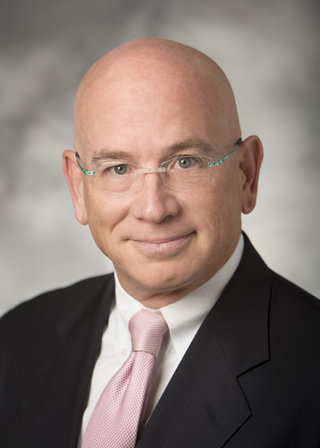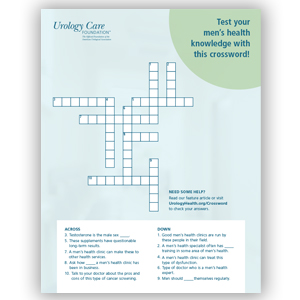| FEATURE |
How Do You Know a Men’s Health Clinic is Being Thorough and Safe?
Men’s health clinics are popping up around the country. It can be hard to tell the difference between those that are safe and those that are not.
“Some men’s health clinics are comprehensive, meaning they look at sexual issues and general health issues,” said Stanton Honig, MD, Professor of Clinical Urology and Director of Men's Health at Yale School of Medicine. “These men’s health clinics are run by people who are usually leaders in their field.”
Then there are men’s health clinics run by people who are not men’s health experts. These clinics are often more about marketing than medical skills. They may only offer treatments such as shockwave therapy for erectile dysfunction and dietary supplements that are questionable regarding long-term results and are considered “experimental” by reputable societies such as the Sexual Medicine Society of North America.
“It's important for patients to know what treatments are reasonable,” said Honig.
Here’s what you should know about men’s health clinics, what questions to ask and what other options are available.
What Problems Can a Men’s Health Clinic Help?
A good men’s health clinic can help with issues like low testosterone or Low T, who are also having symptoms. Testosterone is the male sex hormone made in the testicles. Low testosterone can cause tiredness and a low sex drive. Some men’s health clinics call themselves “Low T Centers.” If you go to one, ask who’s running it. Is it a urologist who treats a variety of men’s health issues? Is it an endocrinologist who treats hormone problems? Both types of doctors can treat low testosterone. Doctors who aren’t familiar with testosterone management may just offer treatment and move on. That’s a problem because men on testosterone need proper follow-up care.
A good clinic will evaluate you for the cause of the problem, treat you only if you are having symptoms and will offer all delivery systems of testosterone. These include testosterone injections into the muscle and into the subcutaneous tissue, subcutaneous pellets, oral pills and nasal sprays. They will monitor patients during treatment with regular checkups and blood work to evaluate the prostate, hematocrit (or blood count) and questions about cardiovascular health. They will also ask if you plan on having children soon as testosterone treatment can negatively affect fertility.
A men’s health clinic can treat erectile dysfunction. That’s when a man has trouble getting or keeping an erection firm enough for sex. Ejaculation is when semen is released from the penis. Some men ejaculate too soon (premature ejaculation), some men take a long time (delayed ejaculation) and some men do not ejaculate at all. Ejaculation problems can also be treated at a men’s health clinic. A good men’s health clinic will offer all treatments such as oral pills like Viagra or Cialis, penile injections, vacuum erection devices, intra-urethral pellets or penile implants. They may offer shockwave therapy or other therapies but clarify that it is considered experimental. If they do not offer something, they should offer a referral to doctors who do.
Another common problem treated by men’s health clinics is male infertility. That’s when a man is not able to get a woman pregnant after they’ve been trying over a certain period of time. This can be caused by low sperm count, issues with sperm delivery or hormone problems.
Men’s health clinics can help with prostate cancer and testicular cancer awareness, as well as treatment for an enlarged prostate. All these issues can be stressful, which is why you need the right doctor. “The doctors that best understand these issues are urologists,” said Honig. “They’re experts in men’s health.”

"The doctors that best understand these issues are urologists. They're experts in men's health."
Stanton Honig, MD
Professor of Clinical Urology and Director of Men's Health at Yale School of Medicine
Key Questions to Ask
There are many types of men’s health clinics. It can be hard to find one that’s safe and right for you. Here are some key questions that may be helpful to ask before making a decision.
What services does the clinic offer?
Men’s health clinics often focus on issues like low testosterone, an enlarged prostate, prostate cancer and erectile dysfunction. But men may have other health problems too. So be sure to ask about the types of services available and if they offer referrals. Some men's health clinics can refer you to a heart doctor (cardiologist), a primary care doctor or a mental health professional to name a few. Other clinics can refer you for colon cancer screening.
What types of doctors see patients?
Just because someone works at a men’s health clinic doesn’t mean they are a men’s health specialist. Men’s health specialists, such as urologists, work in many places such as private practices, general urology offices and academic medical centers.
When asking abut what types of doctors see patients, it may also be helpful to ask about their background and if they have any extra training in areas of men’s health such as prostate, sexual or reproductive function.
What treatments are available for my issue?
It may be helpful to know if the clinic only sells one type of treatment like pills for sex or if they offer a variety of treatments without favoring one.
For example, there are many treatments for an enlarged prostate. They include different pills and procedures. If you go to a clinic that only offers one type of pill or surgery for enlarged prostate, you may not be getting the best care.
How much will the treatment cost?
For example, there are “shot clinics” that only do penile injections. A bottle of medicine for these shots may cost $80-$100 from a private compounding pharmacy. But at a men’s health clinic, they can cost $1,000 or more. These clinics make a big profit because people may not be informed and may not know the right questions to ask.
Knowing if a men’s health clinic accepts insurance can be helpful. Always ask about the out of pocket cost of treatment options before making your decision.
What experience does the clinic have with patients?
Find out how long the clinic has been in business and look up reviews to see what other people have to say about their experiences. This may help you get a better sense of its reputation. However, be aware that online reviews sometimes have more to do with office issues as opposed to quality of care that you receive.
What Other Options Do I Have?
After getting more details about a men’s health clinic, you may wonder if that’s the only option for proper care and treatment. The good news is there are more options you may want to explore before making your decision. “You really want someone who's going to give you a balanced view of your options,” said Honig. “It may be more valuable to seek out a men's health specialist than an actual men’s health clinic.” There are a few good websites to start with when looking for a men’s health specialist.
- Sexual Medicine Society of North America
- Society for the Study of Male Reproduction
- Urology Care Foundation - The Official Foundation of the American Urological Association
Every man is unique, so talk to your doctor about what’s right for you.
More Information
Listen to our Urology Care Podcast on Myths and Facts about Men’s Health featuring Dr. Stanton Honig.

Test your men's health and urology knowledge with this crossword! Click on the puzzle to download.
Need some help?
Read through the feature article or visit UrologyHealth.org/Crossword to check your answers.
UrologyHealth.org | SUMMER 2021 | UROLOGYHEALTH extra